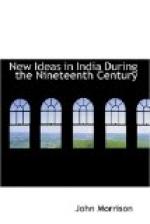[Sidenote: The spread of monotheism traced.]
It is interesting to note how monotheism spread. The Br[=a]hma Sam[=a]j of Madras was founded in 1864, theistic like the mother society, the Br[=a]hma Sam[=a]j of Bengal. Three years later the first of similar bodies on the west side of India was founded, the Pr[=a]rthan[=a] Sam[=a]jes or Prayer Associations of Bombay. Their very name, the Prayer Associations, implies the dual conception of God and Man, for the pantheistic conception does not admit of the idea of prayer any more than it admits of the other dualistic conceptions of revelation, of worship, and of sin. These movements, again, were followed in the United Provinces and the North-West of India by the founding of the [=A]rya Sam[=a]j, or, as I have called it, the Vedic Theistic Association, also professedly theistic. Polytheism and pantheism alike, the [=A]ryas repudiate. For the gods and goddesses of the Hindu pantheon, the founder of the [=A]ryas declared there was no recognition in the Vedas. Demonstrable or not, that is the [=A]rya position. The rejection of pantheism by such a body is noteworthy, for pantheism is identified with India and the Vedanta, the most widely accepted of the six systems of Indian philosophy, and the [=A]rya Sam[=a]j is nothing if not patriotic. It is above all pro-Indian and pro-Vedic. Their direct repudiation of pantheism may not be apparent to Western minds. [=A]ryas predicate three eternal entities, God, the Soul, and Matter,[77] and this declaration of the reality of the soul and of matter is a direct denial of the pantheistic conception, its very antithesis. One pantheistic formula is: “Brahma is reality, the world unreality” (Brahma satyam, jagan mithy[=a]). The Pantheist must declare, and does declare in his doctrine of Maya or Delusion, that the soul and matter are illusions.
[Sidenote: The progress of monotheism seen in the Text-book of Hindu Religion.]




